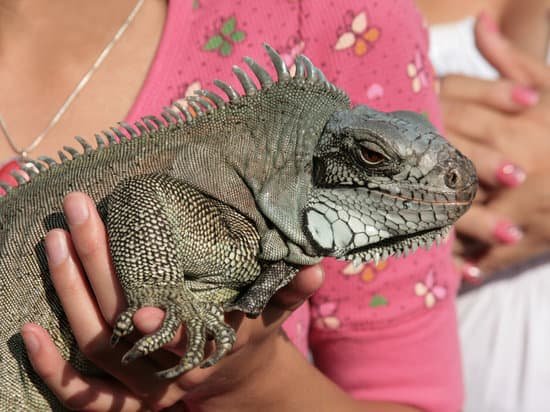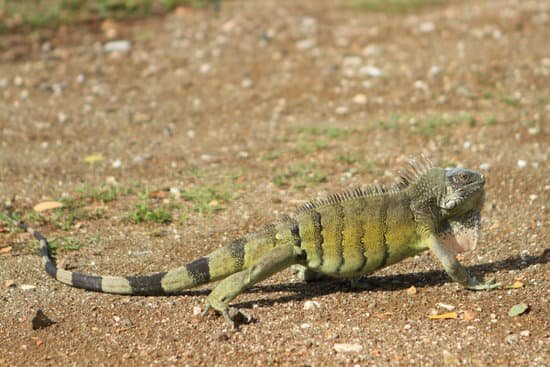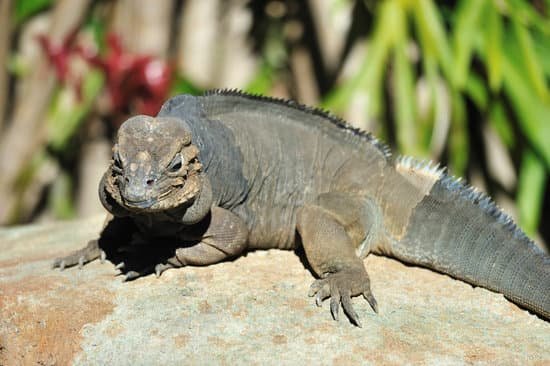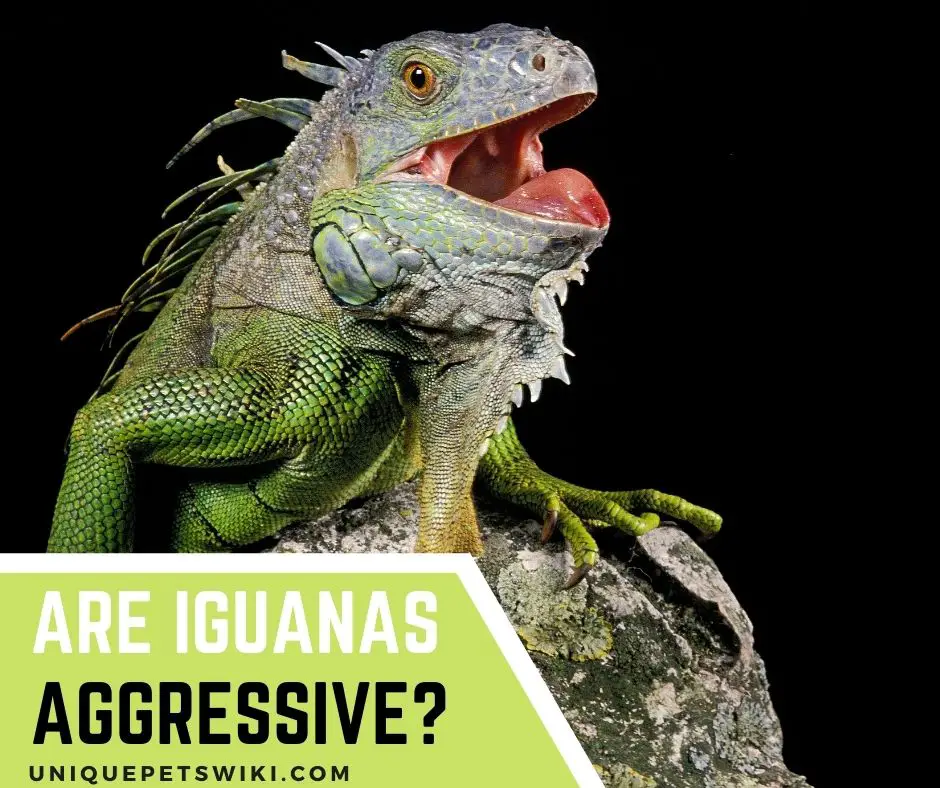Iguanas are among the most popular lizards that can be kept as a pet. They usually grow to a large size, and it is quite hard for beginner hobbyists to care for them. However, one of the things that most people wonder about before buying iguana is whether they are aggressive to humans.
Generally, iguanas are not dangerous animals if you can treat them with caution, knowledge, and respect. This is because of their excellent defensive skills, and they can try to attack when threatened. Iguanas can defend themselves by biting, scratching, and whipping their tails.
In this article, we will shed more light on whether iguanas are aggressive to humans, from what can make them aggressive to humans to how you can prevent it.
This article has been reviewed by Dr. Dilber. Read more about our knowledge control process here.
Contents
Are Iguanas Aggressive To Humans?
No, iguanas don’t usually get aggressive to humans. However, iguanas can bite humans when they are defending themselves. They have sharp teeth used for tearing plants, and it can be painful to humans.
The good thing is that they give a warning before they attack humans. Apart from being aggressive to humans, iguanas can dig lengthy tunnels that can damage seawalls, landscape foliage, and sidewalks.

Confrontational Behaviors When Iguanas Aggressive
Generally, iguanas are not aggressive but can display aggressive behavior as a defense mechanism or during mating season. Iguanas can also become aggressive to show dominance, especially when kept with another iguana or when looking for the best mate for reproduction.
Iguanas are quite a formidable opponent when aggressive. This is because of their numerous body parts like strong teeth, sharp claws, and heavy spiked tails. All of these can be quite dangerous whenever they are aggressive.
It is best to take an aggressive iguana seriously as they have a painful bite.
Warning Signs Iguanas Might Attack
They show aggression when they are interrupted while eating food. They also bite when they are threatened or stressed.
Iguanas show several signs when they are about to bite. You can keep an eye out for these signs to avoid getting bitten. Once you notice any of these signs, you should leave your iguana alone.
- Bobbing of the head: This is a key sign that your iguana is about to get aggressive. Iguanas bob their head up and down repeatedly, and bobbing their head can be fast or more slowly.
- Standing on their fours: Iguanas usually do this to appear bigger whenever they are under threat.
- Puffing up their body: Iguanas also use this method to look bigger. They breathe in deeply to help puff up their body.
- Hissing: Just like many lizard species, iguanas hiss, and it is best to stay away from when this happens.
- Lowering the dewlap under their chin is a unique behavior displayed by iguanas when aggressive.

Iguanas can show at least one of the signs above when they feel under threat and can become aggressive. However, there are some unusual situations where iguanas can bite without any warning. This is usually in a rare situation.
What Happens If Iguanas Bites You
The good thing is that iguana bite is not poisonous as they have atrophied venom glands that produce weak and harmless venom. The bite can cause inflammatory reactions on the site that are due to the anti-inflammatory response of the immune system. The inflammation will decrease with time gradually. However, their bite can cause severe damage to ankles, fingers, face, and wrists.
All you can do when an iguana bite you is to first clean the bite with warm water and soap. You can then contact a medical professional for advice. The doctor can then help recommend other treatments or antibiotics to use based on how severe the bite is.
It is best to contact your doctor because most iguanas carry salmonella bacteria that can lead to severe illness in a human.
Reasons Why An Iguana May Be Aggressive
Iguanas can become aggressive and bite or try to bite you for several reasons. Some of these reasons are stated below.
Iguanas Aggressive When Feeling Threatened Or Rivaled
One of the common causes of aggression in iguanas is fear. Generally, iguanas usually prefer to run than to fight when they feel threatened in the wild. But this is not the case when in captivity as there is no option to run; they will have to be aggressive.
Male iguanas are usually more aggressive if you keep them with other pets. Iguanas are very territorial and will try to dominate the other pets.

Signs That Shows That An Iguana Is Scared
Some of the other signs that indicate that your iguana is scared are
- It tries to escape from its enclosure
- The iguana is skinny because it is not eating very well
- It is hard to tame the iguanas.
What Owners Can Do To Make Iguanas Feel Comfortable
It is common for iguanas that are not properly socialized, especially new iguanas, to be aggressive. You can help your iguanas by properly socializing and taming them.
The first step to ensure your iguana is acclimatized to a new environment is by giving it some weeks to settle in before you even try to tame it. You can then set up a routine for feeding, cleaning, and handling your iguana to make it feel safe and secure.
Another thing is to talk to your iguana daily to help it identify your voice and get used to it when you are around. When planning to keep two iguanas, you need to avoid housing the iguanas in a small enclosure to avoid aggression towards each other.
Your Female Iguanas Aggressive In Breeding Seasons
Although female iguanas are not as aggressive as their male counterparts, they can also display aggression during the breeding season. The breeding season for iguanas usually starts from October to February.
Signs Of A Breeding Female Iguana
Here are some signs that you can use to determine that your female iguana is about to breed or breeding.
- It is bobbing its head.
- It is restless and aggressive.
- A female iguana can change color to orange or brown during the breeding season.
- Your iguana refuses to eat.
- Your iguana is digging the tank for a spot to lay an egg.
- Your female iguana breaks its potty habits.
Female Behaviors In Breeding Seasons
Male iguanas are not usually very aggressive during the breeding season like females. During this period, the female will be restless and aggressive. Once ovulating, it will start to find a spot where it can lay its eggs whether the egg is fertilized or not.
Once they see a suitable spot, they will start to dig the spot to then lay its egg there. Female iguanas may also refuse to eat, and their potty habits will change.

How To Control And Deal With Female Iguana Aggression
You can deal with aggression in the female by providing a nesting site for your iguana where they can lay the eggs. Another way to reduce aggression is by giving it a warm bath.
Your Male Iguanas Aggressive In Breeding Seasons
Even a cool-headed iguana can become aggressive during the breeding season. They can be aggressive for about 3-5 weeks during this period.
Signs Of A Breeding Male Iguana
Here are signs that a mature male iguana can give when breeding.
- Your iguana is anxious and restless.
- Your iguana can be aggressive in the cage, ruin accessories, and hit the snout against the glass.
- Your iguana may follow you around the house and try to whip its tail
- It will bob its head very often.
- Your iguana will try to mark its territory pooping in a random spot in its enclosure.
- Your iguana can become brighter in color, and the pores become larger.
- The male iguana can secrete sperm around its cage or house.
- Your iguana may refuse to eat during the breeding period.
- The iguana may mate with inflatable toys, stuffed toys, or clothing if there is no female.
Male Behaviors In Breeding Seasons
Male iguanas can become aggressive towards other iguanas or other animals during the breeding season. The male iguana will start to protect their territory and can become aggressive to anything that comes to their territory if they are free-roaming in your house.
Furthermore, you should keep male iguanas away from each other if you keep them in the same enclosure to avoid fighting.
How To Control And Deal With Male Iguana Aggression
A great way to help male iguanas during the breeding season is by giving them space to roam around. Male iguanas can also become aggressive because of sperm accumulation in their vent. You can help your iguana by removing the excess sperm by massaging the vent area.
Another thing you can do is provide a hump toy to help your iguana secret the sperm in their vent. You can also assert dominance by standing your ground and speaking loudly to your iguana to leave whenever it tries to follow or attack you.
Giving a male iguana a warm bath can also help them to relax.
Iguanas Aggressive Are Angry, Stressed, Or Nervous
There are times when iguana can be aggressive because they are stressed, angry, or nervous. When this happens, your iguana can bite or lash out with its tail. This is common for new iguanas and should stop this once you have fully tamed your iguana.
Things That Make Your Iguana Angry, Stressed Or Nervous
- Can be aggressive if taken outdoors for the first time.
- Some iguanas hate certain colors on clothing.
- If you wear something on your head that it hates.
- There are other pets around them.
- There is too much noise or sudden moves around them.
What Owners Should Do To Reduce Stress On Iguanas?
Here are some ways that you can help your iguanas to reduce stress.
- You should always approach and handle your iguana with care.
- Introduce your iguana to the outdoors slowly.
- Wear clothes with certain colors that your iguana likes, like red or purple.
- Avoid making sudden movements when around your iguana.
- Do not scream or make noise around your iguanas.
- Avoid approaching your iguana from above but from the side.
Wrapping Up
Iguanas are territorial creatures and can attack humans when threatened. They are large-sized lizards with sharp teeth, and they can inflict serious bites on humans.
However, they are a friendly and relaxed pet, and the likelihood of injuring you is quite low if you have the right knowledge and handling procedures.
We hope this article helps provide enough information about iguana behaviors and why iguanas can become aggressive to humans. If you have any questions or comments, you can leave that in the section below.
